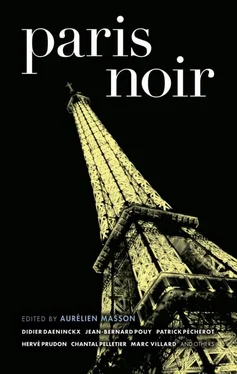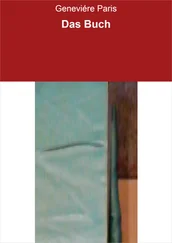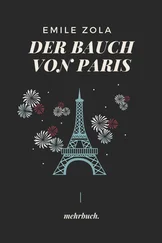Salim Bachi - Paris Noir
Здесь есть возможность читать онлайн «Salim Bachi - Paris Noir» весь текст электронной книги совершенно бесплатно (целиком полную версию без сокращений). В некоторых случаях можно слушать аудио, скачать через торрент в формате fb2 и присутствует краткое содержание. Город: New York, Год выпуска: 2008, ISBN: 2008, Издательство: Akashic Books, Жанр: Детектив, на английском языке. Описание произведения, (предисловие) а так же отзывы посетителей доступны на портале библиотеки ЛибКат.
- Название:Paris Noir
- Автор:
- Издательство:Akashic Books
- Жанр:
- Год:2008
- Город:New York
- ISBN:978-1-933354-63-7
- Рейтинг книги:3 / 5. Голосов: 1
-
Избранное:Добавить в избранное
- Отзывы:
-
Ваша оценка:
- 60
- 1
- 2
- 3
- 4
- 5
Paris Noir: краткое содержание, описание и аннотация
Предлагаем к чтению аннотацию, описание, краткое содержание или предисловие (зависит от того, что написал сам автор книги «Paris Noir»). Если вы не нашли необходимую информацию о книге — напишите в комментариях, мы постараемся отыскать её.
Paris Noir — читать онлайн бесплатно полную книгу (весь текст) целиком
Ниже представлен текст книги, разбитый по страницам. Система сохранения места последней прочитанной страницы, позволяет с удобством читать онлайн бесплатно книгу «Paris Noir», без необходимости каждый раз заново искать на чём Вы остановились. Поставьте закладку, и сможете в любой момент перейти на страницу, на которой закончили чтение.
Интервал:
Закладка:
“Life here is not Parisian, no sidewalk cafés, no shops, no strolling around in the sun. It’s a life of shadows. The banks of the Seine and the Champs-Élysées are elsewhere, but the Seine is a bland sauce and the Champs-Élysées is paved with soft stones. The History of France is declaimed out there, under l’Arc de Triomphe. Paris is a grandiloquent city; it shines but leaves everyone in the dark, and the featherless Gallic Rooster is disguised as a phosphorescent peacock. The history of the French people is no longer written in newspapers or books, it went to sleep somewhere between long ago and formerly, between elsewhere and further away, but rue de la Santé is the bottom you hit before you bounce up again. De Gaulle and Mitterrand were treated in Cochin, all the great criminals made a stay in the prison, and in Sainte-Anne the pathways are called Maupassant, Baudelaire, or Antonin Artaud. Rue de la Santé is a black knife, a cutthroat alley, a cold trench, a fault, a slit, a scar, a short silence, and a draft of cold air. Every particle of air is a piece of shrapnel slashing through your brain. Far from the crowd, the passerby you encounter is an escapee, a survivor on suspended sentence, a jailbird, an abnormal person, or even an anchorite. At any rate a foreigner, not a citizen. He can’t be a tourist, an employee, or a storekeeper. A neighbor, perhaps, but from what side? He can’t ignore you, there’s nowhere he can look, he wants to hug you — or bump you off. He seems to know you, or recognize you. He already saw you in good company when he was in the padded cell, or solitary, or on a gurney, in prayer or in sorrow. It’s not the clash of civilizations, it’s the drift of continents. The guy in front of you is an iceberg in a thick fog. You’re ready to fight to the death, because this is where it’s happening, on rue de la Santé, at last you’re going to battle, after wandering around this fucking snail-shaped city for years without finding your niche — or the exit.”
“Mom died today. Or maybe yesterday, I don’t know. But I know she died today. Or maybe yesterday, I didn’t know. What does it matter? Yesterday, today, dead or not, her or me? Last night I reread Camus’s The Stranger to fall asleep. Result: I didn’t sleep at all. I dreamed that a dog who was allowed to go anywhere was dragging me by the sleeve through the sleaziest places you could think of, dungeons of passing time, the bottoms of which you could never get out of since the social elevator’s broken and the competition is international, I was in a nine-square-yard cell with two other inmates, I was on a hospital bed next to a cancer of the liver, I was like an overmedicated zombie in a cafeteria in Sainte-Anne and the dog was telling me to hurry up, we still had to visit the Catacombs and the Montparnasse cemetery. That dog finally left me alone but I began thinking about our appointment. I really shouldn’t have done that, because I hold you completely responsible for making me come here and then leave without getting anything. It would have been better not to come and not to think about it.
“At 9:30 a.m. I left the house at the last minute to see if I had any mail. There was that letter from the eviction officer about my unpaid rent and the eviction notice. My father died penniless and my mother worse, all alone, she’d even lost her mind. Paris was off limits for her, because of her blood pressure and the high rents. For her, Paris was no way to live. For me, that’s all there was. In the ’60s I’d already burned down all the projects outside Paris with napalm the way cobalt can get rid of your cancer.”
“When I was a kid I always dreamed of the Champs-Élysées, the banks of the Seine, and the Quartier Latin. I lived twenty miles from Paris in low-income housing. My father was general-in-chief of the middle class and a representative of smalltown France. That just shows you he didn’t exist. He used to bike back from the station and into the parking lot in front of the neighbors’ cars and their wives’ windows. Of course he had battle plans and naval maps in his pockets but he wouldn’t spread them out in front of his family who had homework to do or dinner to make. In the ’50s and ’60s the son of a modest wage earner in the southern suburbs could consider a career as a teacher in Paris. Paris was a conquerable citadel. The kind of target you could hit. It seemed to me the right spot for a young man with some French culture to have the firm illusion he’d be living in the center of the world. But it wasn’t a target made of concentric circles, it was more like a spiral with a constantly moving center. The more Parisian I was, the more of a stranger I was. An immigrant. I didn’t even give myself the right to vote, or a work permit. I would settle into apartments without paying the rent until I got evicted. I could always manage to melt into the city, I looked like seaweed, the spitting image of the crowd. I lived by writing and lying; in other words I lived on nothing. Most of the time I lived underwater, in the fog, but with the technique of the flying fish, I had flashes of scintillating lucidity that lead me to say I actually did live. Or at least I think so.”
“It seemed to me that in the ’70s, as I emerged in Paris, I was reproducing the fate of all humanity, I was like that fish with legs coming out of the ocean and becoming a monkey in a few million years, then a man; I was on dry ground, the promised land. I came from the southern suburbs, I didn’t realize I was leaving that impalpable, infinite, slimy old-people’s home to its economic stagnation and unemployment, hopelessness and mindlessness. I landed at the Porte d’Orléans, and I stuck there, all around Denfert, Montparnasse, and Port-Royal, without ever crossing the Seine. At least back then, the people of the 14th looked middle class and not yet like a bunch of chickenshits sliding into impoverishment. But I didn’t want to be prosperous. I wanted to be Verlaine or François Villon. Verlaine ended his life here, in the hospital neighborhood, going from sleazy hotel to hospice, from the arms of Eugénie Krantz and Philomène Boudin, well-known prostitutes, to the less tender arms of the hospital sisters in their habits.”
“I ended up at Cochin Hospital. Not really ended. Not really continued. I stopped there. The Achard wing is a huge blue thing that would bring anybody down, but from the ninth floor you can look out over all of Paris. At night it looks like the scintillating sea. I had become the ghost of a big crow and I had a rotten egg in my esophagus. A bodyguard never left my side: It was a kind of giraffe or gibbet from which a goiter was hanging, a bladder, a belly heavy from chemotherapy. I also had a syringe on my lap, and in my chest a tube between a vein and pipes through which substances were flowing. Every morning a stretcher bearer would come get me and take me to an ambulance that crossed the city toward the Place Gambetta. In a sci-fi-setting I was bombarded by X-rays to the music of Keith Jarrett. In the big waiting room where a horde of frightened paupers were waiting, I would smoke Craven “A”s while waiting for the ambulance drivers to come back. I no longer thought about downing large quantities of alcohol, I was much calmer. I had no desire to get out of there and into a café, didn’t feel like picking up girls either. I had all I needed, because on the one hand I could see my life like a real thing and not a beautiful piece of fruit, and on the other my life was an object of care for all the people who surrounded me, and that gave it a certain reinforced substance. I was naked in my life but that life was an air cushion. The weight I’d lost was the weight of guilt, bad fat. I felt unbelievably forgiven. Of course I was wrong, but as long as I was in the hospital or even in the ambulance listening to the drivers’ bullshit, I was untouchable — admirably lucid, but only relevant on one side of the wall, nine stories higher than other peoples’ lives.”
Читать дальшеИнтервал:
Закладка:
Похожие книги на «Paris Noir»
Представляем Вашему вниманию похожие книги на «Paris Noir» списком для выбора. Мы отобрали схожую по названию и смыслу литературу в надежде предоставить читателям больше вариантов отыскать новые, интересные, ещё непрочитанные произведения.
Обсуждение, отзывы о книге «Paris Noir» и просто собственные мнения читателей. Оставьте ваши комментарии, напишите, что Вы думаете о произведении, его смысле или главных героях. Укажите что конкретно понравилось, а что нет, и почему Вы так считаете.












